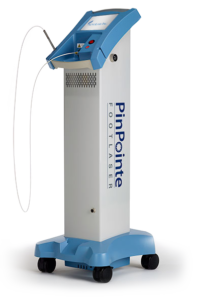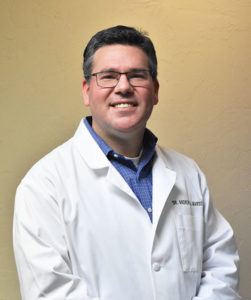Dr. Andrew Marso, DPM and the team at Wisconsin Foot Center will diagnose and treat patients with nail fungus. We take pride in offering the latest technology to treat nail fungus. PinPointe FootLaser is a safe and painless new procedure that changes the way nail fungus is treated. Get your foot care today!
Dr. Andrew Marso also provides care for a range of toenail and skin conditions. These include ingrown toenails, cracked heels, and plantar warts. Another nail condition that tends to be quite common is toenail fungus.
How is Toenail Fungus Diagnosed?
Dr. Marso will examine your nails. He may also take some nail clippings or scrape debris from under your nail and send the sample to a lab to determine the type of fungus causing the infection.
Other medical conditions, such as psoriasis, can look similar to a fungal infection of the nail. Yeast, bacteria, and other microorganisms also can infect nails. Knowing the cause of your infection can help confirm the ideal course of treatment.
How is Toenail Fungus Treated?
 Fungal nail infections do not go away on their own. Left untreated, the stubborn infection will continue to worsen over time.
Fungal nail infections do not go away on their own. Left untreated, the stubborn infection will continue to worsen over time.
Treatment will depend on the severity of your condition and the type of fungus causing it. It can take months to make improvements. And even if your nails make progress, repeat fungal infections are common.
Laser treatment
- Not only is this the newest method for clearing up fungal infections, it is also the most effective. Our laser treatment for fungal nails is FDA-approved and performed in our office. After the session is over, roughly 15-20 minutes, you can walk out the front door and carry on with your normal daily activities.
Medications
Dr. Marso may prescribe antifungal drugs that you take by mouth or apply to the nail. In some cases, it helps to combine oral and topical antifungal treatments.
- Oral anti-fungal medication. These drugs are often the first choice because they clear the infection more quickly than do topical options. Common antifungal medications include terbinafine (Lamisil) and itraconazole (Sporanox). These drugs help a new nail grow free of infection, slowly replacing the infected part. You typically take this type of drug for six to 12 weeks. But you won’t see the end result of treatment until the nail grows back completely. It may take four months or longer to eliminate an infection. Oral antifungal medication may cause side effects ranging from skin rash to liver damage. You may need occasional blood tests to check on how you’re doing with these types of drugs. These medications are generally not recommended for people with liver disease or congestive heart failure or those taking certain medications.
- Topical medicated polish. This medication is applied to the surface of infected toenails, which means it cannot reach fungal spores located underneath nails. So a complete clearance of the fungus may not be possible.
- Medicated nail cream. These creams may work for some with early-stage fungus and thin nails. If the fungal infection has been present for a long time it’s unlikely this solution will be effective.
A multifaceted approach is best since toenail fungus tends to be stubborn, and difficult to clear the infection. To that end, Wisconsin Foot Center is pleased to offer a package deal that combines all three treatments for optimal effectiveness.
Do Home Remedies or Vinegar Kill Toenail Fungus?
A number of natural or home remedies for toenail fungus will help with the symptoms and cosmetics of the nail but not the root cause.
Urea-based moisturizers and soaking can help make the nails softer, less brittle, and easier to trim. But none of these at-home treatments kill fungal spores.
Is there a natural treatment for toenail fungus?
If by natural you mean, a non-medication-based form of treatment, the answer is yes.
Topical creams and soaking can improve the symptoms and cosmetic look of the toenails but will not kill the fungus
For those looking to eliminate the fungal infection, laser nail fungus treatment is an option that does not require medication and is provided by Dr. Marso and Wisconsin Foot Center.

Fungal Toenail Prevention
We are certainly able to provide the fungal nail treatment you need, but our patients typically prefer to avoid the condition altogether. Fortunately, there are measures you can take to reduce your risk and, even better, they are not particularly difficult or complicated. These include:
- Keep your feet dry.
- Wash your feet daily with soap and water.
- Keep your nails properly trimmed.
- Wear socks that wick away moisture.
- Choose footwear that allows your feet to breathe.
- Wear shower shoes or sandals in locker rooms, public showering areas, and on pool decks.
- Be careful when visiting nail salons.
- Use antifungal powder or spray in your shoes.
Top Fungal Toenail Care in Greater Milwaukee
This common fungal infection is embarrassing, unsightly, and even poses a potential risk to diabetic individuals, but the good news is that Dr. Andrew Marso can treat it for you.
We take pride in providing exceptional podiatric services for all our patients from across the greater Milwaukee community. For additional information, or to request an appointment with Wisconsin Foot Center, simply call (414) 425-8400 and our staff will be glad to help.

Request an Appointment
© Wisconsin Foot Center. All Rights Reserved. Website & Marketing By Podiatry Growth

